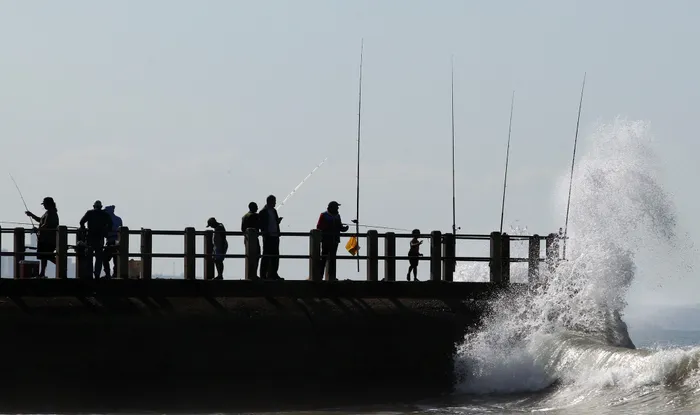Not enough fish in the sea for the poor

Anglers on Durban’s North Pier. Fishing policies do not consider the unique situation of KZN’s subsistence fisher people, say experts. Picture: Doctor Ngcobo Independent Newspapers
Durban — Many of South Africa’s endemic fish species are under threat because of unsustainable practices. Effective fishery regulation is critical to remedy the situation.
That’s according to UKZN public policy specialist Belinda Johnson who graduated with her PhD last month.
In her study, Johnson examined the regulations governing the South African linefish sector and their effectiveness in ensuring sustainable resource use, preventing overfishing and maintaining the health of the marine ecosystem. It also assessed whether the regulations provided equitable access to resources for all stakeholders, including commercial, recreational and subsistence fishers.
“The thrust of my work was to have a look at the policies and regulations in the linefish sector, how well it is being regulated and what some of the problems are.”
She said the government’s new policy did not recognise the conditions faced by those who relied on subsistence fishing in KwaZulu-Natal.
“We do not have the quantity of fish to support the commercialisation of the small-scale sector that the Western Cape does, and it’s left the different types of subsistence fishermen that we have here in a bit of a bind,” she said.
Johnson’s research analysed the regulatory framework’s strengths and weaknesses and proposed policy improvements for sustainable, equitable and economic stability in the linefish sector, in terms of job creation, income generation and its overall contribution to the local and national economy.
She said the huge volume of recreational fishermen were not aware of the impact of fishing on the different species and a public awareness campaign was needed. Alternatively, authorities should revisit the way that fishing licences were issued.
“With the subsistence fishermen, it’s such a difficult and very heartbreaking thing to look at. Almost every person I interviewed around that area, including government officials, explained that what really does need to be done in those villages and communities is sustainable alternative livelihood and looking at other ways of enriching the community.”
Environmental activist Desmond D’Sa said about 50 000 fisherfolk in the province depended on the ocean to put food on the table. However, the prohibitive cost of the various licences they needed should be addressed by the government.
“With subsistence, you’re not getting a salary, you’re unemployed and this is your only means of catching fish. You can’t let people go to bed hungry when there is an abundance of our own resources,” he said.
D’Sa, from the KwaZulu Natal Subsistence Fisherfolk Forum, said South Africa was selling its fish to international markets through various agreements and yet locals didn’t have food to eat.
“Our responsibility lies in feeding our people first. It cannot be that people are going to bed hungry every day when we have an abundance of fish. We’ll train them to be responsible, we’ll train them on safety. We already have mentorship programmes.
“Once they were trained, they could go out and support their families and fish for a livelihood.”
He said the forum’s mentorship programme provided free fishing rods and licences to fisherfolk.
“There’s so much poverty, there’s so much unemployment, but if you teach people how to fish, you know they’re going to fish for the rest of their life and take food home.”
D’sa also called for the fishing quotas imposed on subsistence fisherfolk to be lifted.
“The guys that go out on boats and trawlers catch tons of our fish. They even have ships anchored offshore, away from the South African coastline and they catch our fish and put it into huge freezers.
“Why can’t we allow people to catch a bit more? Instead of four shad, let’s try it out, let’s test it, let’s work together. Let's use ordinary people’s knowledge and science and culture that they’ve been using over the years.
“Even if you increase it by two fish, you know there’s two extra mouths that are going to be fed,” D’Sa said.
Independent on Saturday
Related Topics: